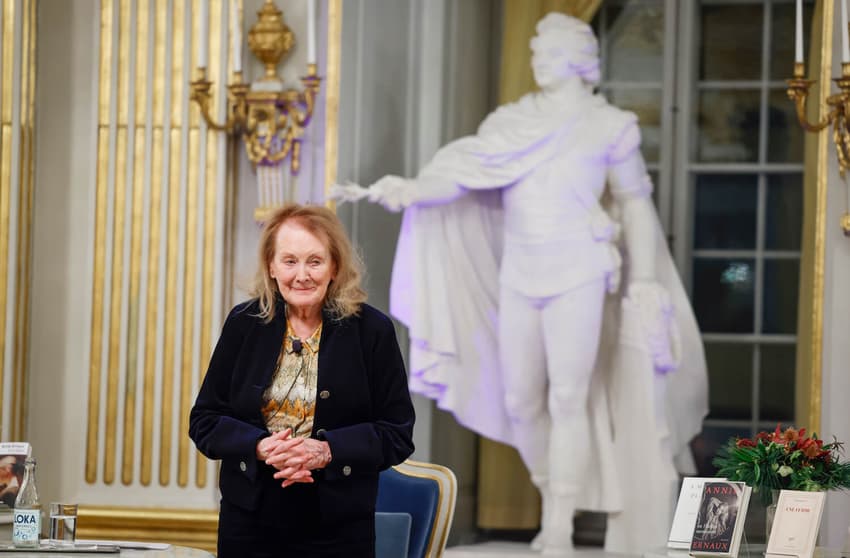Nobel laureate Ernaux warns of 'ideology of withdrawal' in Stockholm lecture

Nobel Literature Prize laureate Annie Ernaux warned Wednesday of a dangerous ideology spreading in Europe under the shadow of the war in Ukraine aimed at excluding society's weakest and limiting women's reproductive rights.
"In Europe, an ideology of withdrawal and closure is on the rise, still concealed by the violence of an imperialist war waged by the dictator at the head of Russia," Ernaux said in her Nobel lecture in Stockholm ahead of Saturday's gala prize ceremony.
Ernaux said it was "steadily gaining ground in hitherto democratic countries."
"Founded on the exclusion of foreigners and immigrants, the abandonment of the economically weak, the surveillance of women's bodies, this ideology requires a duty of extreme vigilance, for me and all those for whom the value of a human being is always and everywhere the same", the 82-year-old said.
A feminist icon, Ernaux was awarded this year's Nobel in October for "the courage and clinical acuity with which she uncovers the roots, estrangements and collective restraints of personal memory", the jury said.
Her writing is heavily drawn from her personal experiences of class and gender, often casting a critical eye on social structures.
In her lecture, she also touched on the protests in Iran that erupted in mid-September following the death of Mahsa Amini who had been arrested by the Tehran morality police.
Ernaux said she took to writing her personal experiences because "a book can contribute to change" and "enable beings to reimagine themselves".
"We see it today in the revolt of women who have found the words to disrupt male power and who have risen up, as in Iran, against its most archaic form".
She noted that growing up as part of the post-war generation, "writers and intellectuals positioned themselves in relation to French politics and became involved in social struggles as a matter of course".
"In today's world, where the multiplicity of information sources and the speed at which images flash past condition a form of indifference, to focus on one's art is a temptation."
She said she hoped that her Nobel Prize was "a sign of hope for all female writers", who "have not yet gained legitimacy as producers of written works".
Comments
See Also
"In Europe, an ideology of withdrawal and closure is on the rise, still concealed by the violence of an imperialist war waged by the dictator at the head of Russia," Ernaux said in her Nobel lecture in Stockholm ahead of Saturday's gala prize ceremony.
Ernaux said it was "steadily gaining ground in hitherto democratic countries."
"Founded on the exclusion of foreigners and immigrants, the abandonment of the economically weak, the surveillance of women's bodies, this ideology requires a duty of extreme vigilance, for me and all those for whom the value of a human being is always and everywhere the same", the 82-year-old said.
A feminist icon, Ernaux was awarded this year's Nobel in October for "the courage and clinical acuity with which she uncovers the roots, estrangements and collective restraints of personal memory", the jury said.
Her writing is heavily drawn from her personal experiences of class and gender, often casting a critical eye on social structures.
In her lecture, she also touched on the protests in Iran that erupted in mid-September following the death of Mahsa Amini who had been arrested by the Tehran morality police.
Ernaux said she took to writing her personal experiences because "a book can contribute to change" and "enable beings to reimagine themselves".
"We see it today in the revolt of women who have found the words to disrupt male power and who have risen up, as in Iran, against its most archaic form".
She noted that growing up as part of the post-war generation, "writers and intellectuals positioned themselves in relation to French politics and became involved in social struggles as a matter of course".
"In today's world, where the multiplicity of information sources and the speed at which images flash past condition a form of indifference, to focus on one's art is a temptation."
She said she hoped that her Nobel Prize was "a sign of hope for all female writers", who "have not yet gained legitimacy as producers of written works".
Join the conversation in our comments section below. Share your own views and experience and if you have a question or suggestion for our journalists then email us at [email protected].
Please keep comments civil, constructive and on topic – and make sure to read our terms of use before getting involved.
Please log in here to leave a comment.